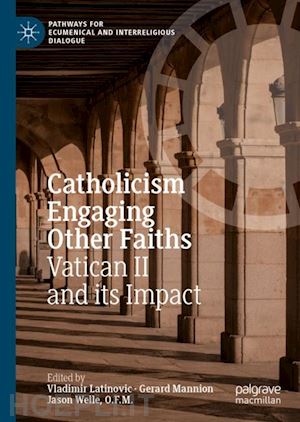
Questo prodotto usufruisce delle SPEDIZIONI GRATIS
selezionando l'opzione Corriere Veloce in fase di ordine.
Pagabile anche con Carta della cultura giovani e del merito, 18App Bonus Cultura e Carta del Docente
This book assesses how Vatican II opened up the Catholic Church to encounter, dialogue, and engagement with other world religions. Opening with a contribution from the President of the Pontifical Council for Interreligious Dialogue, Cardinal Jean-Louis Tauran, it next explores the impact, relevance, and promise of the Declaration Nostra Aetate before turning to consider how Vatican II in general has influenced interfaith dialogue and the intellectual and comparative study of world religions in the postconciliar decades, as well as the contribution of particular past and present thinkers to the formation of current interreligious and comparative theological methods. Additionally, chapters consider interreligious dialogue vis-à-vis theological anthropology in conciliar documents; openness to the spiritual practices of other faith traditions as a way of encouraging positive interreligious encounter; the role of lay and new ecclesial movements in interreligious dialogue; and the development of Monastic Interreligious Dialogue. Finally, it includes a range of perspectives on the fruits and future of Vatican’s II’s opening to particular faiths such as Judaism, Islam, Hinduism, and Buddhism.
Introduction:
1. Catholicism Embracing its Religious Others: Gerard Mannion
2. Vatican II: Remembering the Future: Cardinal Jean-Louis Tauran
Part One: Nostra Aetate: A New Vision in Our Time
3. Nostra Aetate: Dialogue and Dialogues: Archbishop Michael L. Fitzgerald
4. Fifty Years of Nostra Aetate: Opportunities to Transcend Differences: Archbishop Felix Machado
5. Nostra Aetate: Where it has taken us; Where we still need to go: John T. Pawlikowski, O.S.M.
6. The Role of Ecclesial Movements in the Implementation of Nostra Aetate: Roberto Catalano
Part Two: Vatican II’s Impact on Interfaith Method
7. Interpreting the Bible in Relation to Other Religions: Hermeneutics and Identity: Leo D. Lefebure8. Interfaith Dialogue and the Duty to Serve Justice and Peace - Assessing some Anthropological Perspectives of Gaudium et Spes and their Implications: Sandra Mazzolini
9. Rahner’s Kindred: The Legacy of Finitude in Comparative Theology: Taraneh Wilkinson
10. St. Bonaventure’s Illumination Theory of Cognition as the Framework for the Logos Spermatikos in Jacques Dupuis’ Inclusive Pluralism: Richard Girardin
11. Epistemological Openness: A Reformed Neo-Calvinist’s Theological Response to Vatican II and Comparative Theology: Alexander E. Massad
12. Ecclesial Spirituality and Other Faith Traditions: Roger Haight, S.J.
Part Three: The Fruits and Future of Vatican II’s Opening to Other Faiths
13. The Indian Church Opening to the World: Michael Amaladoss, S.J.
14. Monastic Interreligious Dialogue: Dialogue at the Level of Spiritual Practice and Experience: William Skudlarek, O.S.B.
15. Fifty Years of Buddhist-Catholic Relations and Inter-Monastic Dialogue: A Buddhist Perspective: Sallie B. King
16. A Model for Muslim-Christian Dialogue on Care for the Earth: Vatican II, St. Francis and the Sultan, and Pope Francis: Dawn M. Nothwehr, O.S.F.
17. Jews and Catholics in the 21st Century - Lingering Shadows, and the Road Ahead: Jonathan Ray
Conclusion
18. Nostra Aetate and the Small Things of God: Francis X. Clooney, S.J.
Epilogue: Leo D. Lefebure
Vladimir Latinovic teaches Patristics and Church History at the University of Tübingen, Germany.
Gerard Mannion holds the Joseph and Winifred Amaturo Chair in Catholic Studies at Georgetown University, USA. He is also Founding Chair of the Ecclesiological Investigations International Research Network.
Jason Welle, O.F.M., is an invited professor at the Pontifical Institute for Arabic and Islamic Studies in Rome, Italy.











Il sito utilizza cookie ed altri strumenti di tracciamento che raccolgono informazioni dal dispositivo dell’utente. Oltre ai cookie tecnici ed analitici aggregati, strettamente necessari per il funzionamento di questo sito web, previo consenso dell’utente possono essere installati cookie di profilazione e marketing e cookie dei social media. Cliccando su “Accetto tutti i cookie” saranno attivate tutte le categorie di cookie. Per accettare solo deterninate categorie di cookie, cliccare invece su “Impostazioni cookie”. Chiudendo il banner o continuando a navigare saranno installati solo cookie tecnici. Per maggiori dettagli, consultare la Cookie Policy.